英语作业情况调查
关于小学英语家庭作业的调查报告(共五则)

关于小学英语家庭作业的调查报告(共五则)第一篇:关于小学英语家庭作业的调查报告关于小学英语家庭作业的调查报告调查时间:2012年12月调查地点:渔歌小学调查对象:3~6年级学生调查方法:问卷调查法调查人员:李红海调查分工:李红海负责以上三项调查一直以来,我校学生英语家庭作业地完成情况不容乐观。
为了使学生能完成英语家庭作业,更有效地掌握英语,提高家庭作业地效率,2012年12月中旬我制定了关于小学英语家庭作业的调查问卷,对我校三至六年级学生进行了家庭作业地调查。
具体如下:一、调查的方式为了使受调查的学生具有普遍性、客观性,增加调查的可信度,我采用无记名全员答卷的方法,并按年级在校门口设立了作业问卷投票箱,以便学生家长自由表达意见。
然后从每位英语教师任课的班级抽取一个,再从这个班随机抽取18份进行问卷调查汇总,然后对试卷中的各个问题逐项按人次作了统计,结果作为本调查报告的依据。
二、调查的内容本次调查共设计了5道题,包括作业量、完成作业时间、态度、作业批阅与反馈评价以及课外阅读、学生的英语学习兴趣等多方面。
具体题目如下:1、你觉得孩子英语家庭作业量如何?()A非常多B.适中C、较少2、学校教师对家庭作业每次都自己批改吗?()A.每次都坚持批改B.偶尔批改C.不批改3、你认为自己的每天的英语家庭作业量多少比较合适?()A、15分钟左右B.30分钟左右C、1小时左右4、你希望的英语家庭作业类型是()A、抄写为主B、课外阅读为主C、听、读为主5、你喜欢英语学科吗?()A.喜欢B.不喜欢C.马马虎虎三、调查数据分析1、在被调查的家长中,有185人认为英语老师布置的作业量适中,占总数的81.14%,有17人认为我校作业量太少,占总数的7.45%,有人认为我校的英语学科作业量太多,占总数的11.41%。
三、四年英语家庭作业量比较合适,有部分家长认为作业不是很多,五、六年级英语家庭作业量大部分家长认为比较适中,个别教师英语家庭作业量较大。
英语作业检查总结报告

英语作业检查总结报告
背景介绍
本次英语作业检查总结报告旨在回顾学生们最近一段时间的英语作业情况,分
析存在的问题,并提出改进建议,以提升学生的英语学习效果。
检查结果
经检查发现,大部分学生在英语作业中存在以下问题: 1. 拼写错误较多,应注意反复检查拼写; 2. 语法错误较多,需加强对语法知识的学习和应用; 3. 词汇运
用不够丰富,建议多读英语书籍和文章; 4. 缺乏细节描述,应注意丰富写作内容。
分析与建议
针对上述问题,学生可以采取以下措施改进: - 使用拼写检查工具辅助核对拼
写错误; - 多做语法练习,加强语法知识的掌握; - 每天背诵一些新词汇,提高词
汇量; - 注意细节描述,丰富写作内容,使文章更具说服力。
总结
通过本次英语作业检查总结报告,我们可以看到学生们在英语学习中仍有提升
空间,但只要他们能够有针对性地改进自己的学习方法,相信他们的英语水平会有明显提高。
希望学生们能够重视英语学习,在老师的指导下不断进步,迈向更高的学术成就。
小学英语作业设计调研报告
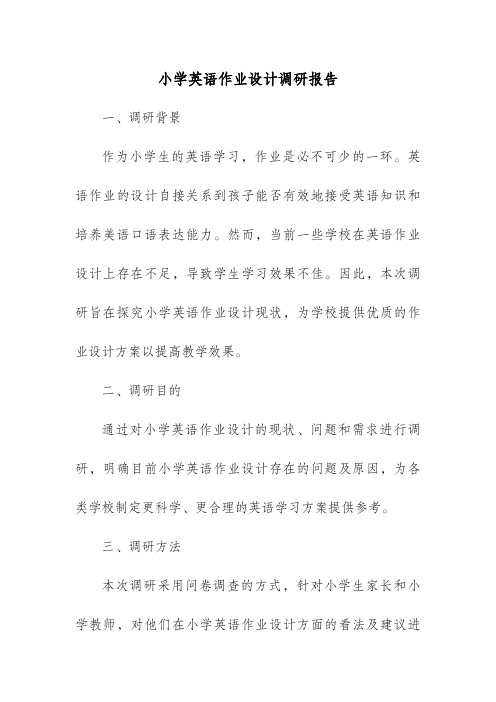
小学英语作业设计调研报告一、调研背景作为小学生的英语学习,作业是必不可少的一环。
英语作业的设计自接关系到孩子能否有效地接受英语知识和培养美语口语表达能力。
然而,当前一些学校在英语作业设计上存在不足,导致学生学习效果不佳。
因此,本次调研旨在探究小学英语作业设计现状,为学校提供优质的作业设计方案以提高教学效果。
二、调研目的通过对小学英语作业设计的现状、问题和需求进行调研,明确目前小学英语作业设计存在的问题及原因,为各类学校制定更科学、更合理的英语学习方案提供参考。
三、调研方法本次调研采用问卷调查的方式,针对小学生家长和小学教师,对他们在小学英语作业设计方面的看法及建议进行调研。
四、调研结果1.作业频率据调查数据显示,87.6%的学生在小学学习期间遇到过“每天都有英语作业”的情况,76.2%的学生每周都会有英语作业。
但是,只有17.3%的学生认为作业量适中,其他学生认为作业量过多或过少。
2.作业种类针对小学生英语作业类型,调查发现填空题、选择题、阅读理和写作类题目最为常见,占比达到88%。
此外,67.9%的学生表示老师很少布置听力作业,而听与说是语言的重要组成部分。
另外,有学生反映出现了一种新的作业形式——朗读课文,这种作业形式能够锻炼学生的口语表达能力。
3.作业难度近一半的学生表示小学英语作业难度适中,而有16.的学生认为作业难度过容易,23.8%的学生则认为作业难度过难。
在针对小学英语作业设计的质量进行评价时,仍有一部分学生对英语作业的难度和质量提出了质疑。
家长参与度调查显示,67.2%的家长表示对孩子的英语作业有一定的参与度,39.2%的家长会主动与老师联系,向老师了解孩子的作业完成情况。
5.教师评估针对小学教师,在英语作业布置的时候,有38.8%的老师会兼顾学生的掌握进度与时间安排,80%的老师会根据考试内容与学生的能力来制定作业。
但是,只有41.8%的老师会根据学习进度设置适当的难度,只有29.2%的老师会针对不同学生设置不同难度的作业。
英语作业研究调查问卷模板

Dear Participants,We are conducting a research survey to understand the current state of English homework assignments among students. Your feedback is crucial in helping us identify areas for improvement and to better align homework practices with educational goals. This questionnaire should take approximately 10-15 minutes to complete. All responses will be kept confidential and used for research purposes only. Thank you for your time and participation.Section 1: Background Information1. Age:- 12-15 years old- 16-18 years old- 19-22 years old- 23-25 years old- 26 years old and above2. Grade Level:- 7th Grade- 8th Grade- 9th Grade- 10th Grade- 11th Grade- 12th Grade- College Freshman- College Sophomore- College Junior- College Senior3. School Type:- Public School- Private School- Home-Schooled- Other (please specify)4. Year in School:- Freshman- Sophomore- Junior- Senior- Graduate StudentSection 2: Homework Quantity and Frequency5. On average, how many hours per week do you spend on English homework? - Less than 1 hour- 1-3 hours- 4-6 hours- 7-9 hours- 10 or more hours6. How often do you receive English homework?- Daily- Weekly- Bi-weekly- Monthly- Rarely or never7. Do you find the amount of English homework assigned to be reasonable?- Very reasonable- Reasonable- Neutral- Unreasonable- Very unreasonableSection 3: Homework Type and Purpose8. What types of English homework assignments do you typically receive? (Select all that apply)- Reading assignments- Writing assignments (e.g., essays, short stories)- Grammar exercises- Vocabulary exercises- Listening comprehension tasks- Speaking tasks- Research projects- Other (please specify)9. What is the primary purpose of your English homework assignments? (Select all that apply)- To reinforce what is learned in class- To prepare for tests and exams- To improve writing and speaking skills- To develop critical thinking and analysis skills- To encourage independent learning- To fulfill school or teacher requirements- Other (please specify)Section 4: Homework Support and Challenges10. How often do you seek help with your English homework?- Never- Rarely- Sometimes- Often- Always11. Who do you usually seek help from when you have difficulties with English homework? (Select all that apply)- Teachers- Parents/guardians- Friends- Online resources (e.g., tutorials, forums)- Other (please specify)12. What are the main challenges you face with English homework? (Select all that apply)- Difficulty understanding instructions- Time management issues- Lack of resources or materials- Language proficiency barriers- Teacher feedback and grading- Other (please specify)Section 5: Suggestions for Improvement13. If you could change anything about your English homework assignments, what would it be? (Please provide specific suggestions)14. How can teachers or educators better support。
9年级英语课外作业情况问卷调查表
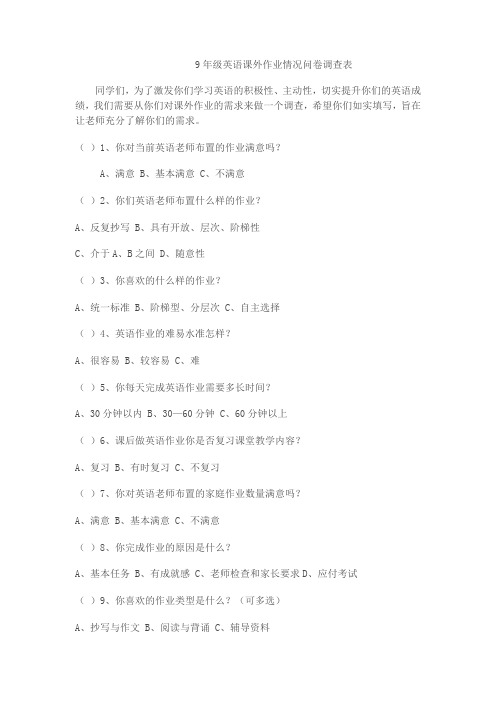
9年级英语课外作业情况问卷调查表同学们,为了激发你们学习英语的积极性、主动性,切实提升你们的英语成绩,我们需要从你们对课外作业的需求来做一个调查,希望你们如实填写,旨在让老师充分了解你们的需求。
()1、你对当前英语老师布置的作业满意吗?A、满意B、基本满意C、不满意()2、你们英语老师布置什么样的作业?A、反复抄写B、具有开放、层次、阶梯性C、介于A、B之间D、随意性()3、你喜欢的什么样的作业?A、统一标准B、阶梯型、分层次C、自主选择()4、英语作业的难易水准怎样?A、很容易B、较容易C、难()5、你每天完成英语作业需要多长时间?A、30分钟以内B、30—60分钟C、60分钟以上()6、课后做英语作业你是否复习课堂教学内容?A、复习B、有时复习C、不复习()7、你对英语老师布置的家庭作业数量满意吗?A、满意B、基本满意C、不满意()8、你完成作业的原因是什么?A、基本任务B、有成就感C、老师检查和家长要求D、应付考试()9、你喜欢的作业类型是什么?(可多选)A、抄写与作文B、阅读与背诵C、辅导资料()10、你认为当前的作业对你学习有协助吗?A、有协助B、一些协助C、无协助()11、你不能完成作业的主要原因是什么?A、不会做B、没时间做C、对英语没兴趣,不想做()12、当遇到不会做的题时,你一般会怎么做?A、自己解决B、请教老师同学或查资料C、放弃不做()13、当作业完成后,你喜欢老师给你什么样的评价?A、鼓励性语言B、打分数C、打√或×即可()14、你对平时英语作业有分析总结的习惯吗?A、有B、很少有C、没有()15、你是否满意现有作业的布置方式?A、满意B、还可以C、不满意16、谈谈你对英语老师布置作业有什么要求和你自己的设想?。
第3次常规检查英语作业检查小结

第3次常规检查英语作业检查小结本次常规检查主要针对学生们的英语作业进行了全面的检查和评估。
以下是对各个方面的检查小结:一、语法和拼写检查:在语法和拼写方面,大部分学生都表现出了较好的水平。
他们能够正确使用各种时态和语法结构,拼写错误较少。
然而,仍有少数学生在一些常用词汇的拼写上出现了错误,需要加强记忆和练习。
二、词汇和句型运用检查:学生们在词汇和句型运用方面的表现也相对较好。
他们能够正确运用学过的词汇和句型,使句子更加流畅和准确。
然而,个别学生在句子结构上出现了一些错误,需要加强对句子结构的理解和练习。
三、篇章结构和逻辑检查:大部分学生在篇章结构和逻辑方面表现出了良好的能力。
他们能够合理组织文章结构,将各个段落连接起来,使整篇文章具有逻辑性和连贯性。
然而,少数学生在篇章结构和逻辑上还存在一些问题,需要加强对文章组织的训练和理解。
四、表达和思维能力检查:学生们在表达和思维能力方面的表现也较为出色。
他们能够用简洁明了的语言表达自己的观点和想法,并能够运用适当的语言技巧进行描述和解释。
然而,仍有个别学生在表达和思维能力方面有待提高,需要加强对语言运用的训练和思维能力的培养。
五、作业完成情况检查:大部分学生都能按时完成作业,并且作业质量较高。
他们认真对待作业,按要求完成,并且注意细节。
然而,仍有个别学生对作业完成情况不够认真,需要加强对作业的重视和完成质量的把控。
综上所述,学生们在本次常规检查的英语作业中表现出了较好的水平。
然而,仍有一些问题需要加以改进和提高。
我们建议学生们在语法和拼写、词汇和句型运用、篇章结构和逻辑、表达和思维能力以及作业完成情况等方面加强训练和练习。
希望学生们能够认真对待英语学习,不断提高自己的英语水平。
初中英语作业调查问卷模板

尊敬的家长和同学们:您好!为了更好地了解同学们在初中英语学习中的作业完成情况,以及家长对英语作业的看法和建议,我们特设计了这份调查问卷。
您的宝贵意见将有助于我们改进教学方法,提高作业质量,促进同学们的英语学习。
请您认真填写以下问卷,感谢您的支持与配合!一、基本信息1. 学生姓名:(请填写学生姓名)2. 年级:(请填写年级)3. 班级:(请填写班级)二、作业情况1. 您的孩子每天完成英语作业的时间大约是多少?A. 30分钟以内B. 30-60分钟C. 1小时以上D. 不确定2. 您的孩子在完成英语作业时,是否经常遇到以下困难?A. 词汇量不足B. 句型结构掌握不牢固C. 听力理解困难D. 阅读理解困难E. 写作技巧不足F. 其他:(请具体说明)3. 您的孩子在完成英语作业时,是否需要您的帮助?A. 经常需要B. 有时需要C. 很少需要D. 不需要4. 您认为孩子的英语作业量是否合理?A. 合理B. 稍微偏多C. 偏多D. 不合理5. 您的孩子是否能够按时完成英语作业?A. 总是能B. 经常能C. 有时能D. 很少能E. 从不能6. 您的孩子在完成英语作业时,是否有以下不良习惯?A. 拖延症B. 粗心大意C. 不认真审题D. 其他:(请具体说明)三、教学方法与作业设计1. 您认为以下哪种教学方法对提高孩子的英语作业完成效果最有帮助?A. 传统的课堂讲授B. 多媒体教学C. 小组合作学习D. 任务型教学E. 其他:(请具体说明)2. 您认为以下哪种作业设计方式更能激发孩子的学习兴趣?A. 基础知识巩固型作业B. 实践应用型作业C. 创新思维型作业D. 综合性作业E. 其他:(请具体说明)3. 您是否希望英语教师在作业中融入以下内容?A. 文化背景知识B. 语法知识C. 词汇积累D. 听力、口语训练E. 其他:(请具体说明)四、家长建议1. 您对英语作业有哪些意见和建议?(请在此处详细阐述)2. 您认为如何才能更好地提高孩子的英语学习效果?(请在此处详细阐述)感谢您参与本次调查问卷,您的意见对我们非常重要!请您在填写完毕后,将问卷交回班主任处。
英语暑假作业检查情况总结

英语暑假作业检查情况总结
以下是一份英语暑假作业检查情况的总结:
1. 完成情况:
总体上,学生们在暑假期间完成了英语作业,包括阅读、写作、语法练习和听力练习等。
大部分学生表现出良好的学习态度和学习习惯,能够按时完成作业。
但是,仍有部分学生未能按时完成作业,需要加强时间管理和自我约束。
2. 作业质量:
大部分学生的英语暑假作业质量较高,能够准确理解和掌握所学的知识点,表现出良好的语言运用能力。
但是,也有部分学生的作业质量不高,存在抄袭、语法错误和拼写错误等问题,需要加强自主学习和自我检查。
3. 知识点掌握:
通过检查学生的作业,发现大部分学生对所学英语知识掌握较好,能够正确运用词汇、语法和句型等。
但是,也有部分学生对某些知识点掌握不够扎实,需要加强复习和巩固。
4. 改进建议:
为了提高学生英语暑假作业的质量和效果,建议教师在布置作业时更加注重作业的针对性和层次性,根据学生的实际情况选择合适的作业难度和内容。
同时,教师还需要加强对学生学习进度的跟踪和指导,及时发现学生的学习困难并给予帮助和支持。
5. 反思与总结:
通过本次英语暑假作业的检查,发现学生们在知识点掌握、作业质量和时间管理等方面存在一些问题。
作为教师,我们需要认真反思自己的教学工作,寻找问题的根源并采取有效的措施加以解决。
同时,我们也需要总结学生们在学习过程中的优点和不足之处,有针对性地开展教学工作,提高教学质量和效果。
英语作业调查问卷分析报告

英语作业调查问卷分析报告简介本报告旨在对所设计的英语作业调查问卷进行分析,以了解学生对于英语作业的态度、习惯以及对教学效果的评价,为教师改进教学方法和作业布置提供参考。
方法设计问卷在设计问卷时,考虑了以下几个方面的内容:1.作业量:包括每周的作业数量和时间分配情况。
2.作业类型:如课后习题、作文、听写等。
3.作业目的:考察作业布置的主要目的,如巩固知识、培养学习兴趣等。
4.作业意义:考察学生对作业的看法和态度。
5.作业反馈:考察学生是否得到及时的作业反馈以及反馈的质量。
调查对象本次调查对象为100名来自不同年级的学生,涵盖了初中和高中阶段。
数据收集和分析通过在线调查平台,我们成功收集到了100份有效问卷回复。
对于每个问题,我们进行了以下分析:1.分析每周作业量和时间分配情况:通过对回答的数据进行统计,我们得到如下结果:–75%的学生表示每周英语作业量合理,不会过多影响其他学科学习;–20%的学生认为作业量过大,会占用过多的学习时间;–5%的学生认为作业量过少,不够充实。
2.分析作业类型和目的:–45%的学生认为课后习题是最常见的作业类型;–30%的学生较多地接触作文类作业;–15%的学生经常进行听写作业;–10%的学生进行其他类型的作业。
关于作业目的,收集到的数据显示:–50%的学生认为作业的主要目的是巩固学过的知识;–30%的学生认为作业的目的是培养学习的兴趣;–15%的学生认为作业的目的是提高英语能力;–5%的学生认为作业的目的是增加学习的压力。
3.分析学生对作业意义的看法:–60%的学生认为作业有助于提高英语学习效果,能够加深对知识点的理解;–20%的学生认为作业只是为了应付教师,对学习没有帮助;–10%的学生认为作业既有助于学习,也增加了学习负担;–10%的学生认为作业没有任何意义,对学习没有帮助。
4.分析学生对作业反馈的满意度:–45%的学生表示作业反馈及时,并且给出了具体的建议;–30%的学生认为作业反馈仅仅是老师简单批改一下,没有给出具体指导;–15%的学生认为作业反馈不够及时,影响了及时调整学习策略;–10%的学生表示没有得到过作业反馈。
小学英语家庭作业情况调查报告范文
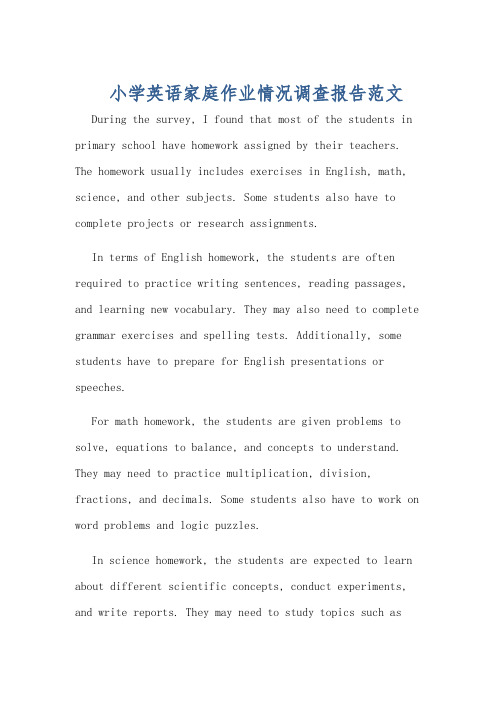
小学英语家庭作业情况调查报告范文During the survey, I found that most of the students in primary school have homework assigned by their teachers. The homework usually includes exercises in English, math, science, and other subjects. Some students also have to complete projects or research assignments.In terms of English homework, the students are often required to practice writing sentences, reading passages, and learning new vocabulary. They may also need to complete grammar exercises and spelling tests. Additionally, some students have to prepare for English presentations or speeches.For math homework, the students are given problems to solve, equations to balance, and concepts to understand. They may need to practice multiplication, division, fractions, and decimals. Some students also have to work on word problems and logic puzzles.In science homework, the students are expected to learn about different scientific concepts, conduct experiments, and write reports. They may need to study topics such asplants, animals, the human body, the solar system, and the environment. Some students also have to create models or diagrams to demonstrate their understanding.Overall, the students seem to be managing their homework well. They are able to complete their assignments on time and ask for help when needed. However, some students find certain subjects more challenging than others and may require extra support from their parents or tutors.在调查中,我发现大多数小学生都有老师布置的家庭作业。
英语书写作业调查分析

英语书写作业调查分析English Homework Survey Analysis### IntroductionThe purpose of this survey was to gather insights into the effectiveness and impact of English homework assignments on students' learning outcomes. The survey targeted a diverse group of students across different age groups and educational levels to ensure a comprehensive understanding of the topic.### Methodology- Sample Size: The survey included responses from 200 students.- Age Groups: The students ranged from 12 to 18 years old.- Educational Levels: Participants were from middle school to high school.- Survey Tools: Online questionnaires were used to collect data, ensuring anonymity and ease of participation.### Key Findings#### 1. Frequency of Homework- Daily Assignments: 72% of students reported receivingEnglish homework daily.- Weekly Assignments: 23% received assignments on a weekly basis.- Ad-Hoc Assignments: 5% received assignments sporadically.#### 2. Types of Assignments- Reading Comprehension: 45% of students frequently engaged with reading comprehension tasks.- Grammar Exercises: 38% were tasked with grammar exercises. - Writing Assignments: 30% had to complete writing assignments regularly.- Vocabulary Lists: 27% were required to memorize and use new vocabulary.#### 3. Time Spent on Homework- Less than 30 Minutes: 40% of students spent this amount of time daily.- 30-60 Minutes: 45% spent between 30 to 60 minutes.- More than 60 Minutes: 15% spent over an hour on English homework.#### 4. Impact on Learning- Positive Impact: 55% of students felt that homework helped them understand English concepts better.- Mixed Impact: 30% had a mixed experience, finding some assignments helpful and others not.- Negative Impact: 15% felt that homework was not beneficial to their learning.#### 5. Student Preferences- Interactive Assignments: 65% preferred interactive and engaging assignments.- Creative Writing: 58% enjoyed creative writing tasks.- Group Work: 42% liked working in groups on assignments.- Traditional Homework: 35% preferred traditional homework formats.#### 6. Barriers to Completion- Lack of Interest: 40% cited lack of interest in the subject as a barrier.- Time Management: 35% struggled with managing time effectively.- Difficulty Level: 25% found the assignments too challenging. - Lack of Resources: 20% lacked the necessary resources to complete assignments.### ConclusionThe survey indicates that while the majority of students engage with English homework regularly, there is asignificant portion that does not find it beneficial to their learning. There is a clear preference for interactive and creative assignments, suggesting that traditional homework formats may not be as effective. Addressing the barriers to homework completion, such as lack of interest and difficulty level, could potentially improve the learning outcomes for students.### Recommendations- Diversify Assignments: Incorporate a variety of interactive and creative tasks to maintain student interest.- Flexible Time Management: Provide flexibility in assignment deadlines to accommodate different student schedules.- Supportive Resources: Ensure that all students have access to necessary resources and support to complete assignments. - Feedback Mechanisms: Establish clear feedback mechanisms to help students understand their progress and areas for improvement.This analysis provides a snapshot of the current state of English homework assignments and offers actionable recommendations for educators to enhance the learning experience.。
小学英语作业检查情况汇报

小学英语作业检查情况汇报尊敬的各位老师:我是××小学××班的英语教师,今天我给大家带来了本学期小学英语作业的检查情况汇报。
在本学期的教学工作中,我认真备课,精心设计了一系列的英语作业,旨在帮助学生巩固所学知识,提高他们的英语水平。
在检查学生们的作业时,我也发现了一些问题和亮点,下面我将进行汇报。
首先,我检查了学生们的英语书面作业。
在书面作业中,我发现大部分学生能够按时完成作业,并且基本上都能够按要求完成。
他们的书写工整,字迹清晰,表现出了良好的书面表达能力。
但也有少数学生存在着一些拼写错误和语法错误,这需要我们在后续的教学中加强相关知识点的讲解和训练,以提高他们的书面表达水平。
其次,我检查了学生们的口头作业。
在口头作业中,我发现学生们的口语表达能力有了明显的提高。
他们能够用简单的英语词汇进行日常交流,表达自己的想法和情感。
但是也有一些学生在口头表达时存在着紧张和不流利的情况,这需要我们在课堂上多进行口语练习,提高学生的口语表达能力。
另外,我还检查了学生们的课外作业。
在课外作业中,我发现一些学生能够积极主动地完成相关的英语学习任务,他们能够自觉地进行词汇和语法的复习,提高自己的英语水平。
但也有一些学生存在着课外作业懈怠的情况,这需要我们在家庭作业布置和督促方面加强。
最后,我还检查了学生们的课堂表现。
在课堂上,大部分学生都能够积极主动地参与到英语教学活动中,他们能够认真听讲,积极回答问题,课堂氛围比较活跃。
但也有一些学生存在着课堂不专心、不认真听讲的情况,这需要我们在课堂管理和教学方法上加强,提高学生的学习积极性。
总的来说,本学期小学英语作业的检查情况总体较好,但也存在着一些问题需要我们在后续的教学工作中加以解决。
我们将进一步加强学生的英语学习,提高他们的英语水平,为他们的英语学习打下坚实的基础。
同时,我们也将加强与家长的沟通,共同为学生的英语学习努力。
以上就是本学期小学英语作业检查情况的汇报,希望各位老师能够给予指导和帮助,共同努力,为学生的英语学习创造更好的环境。
小学低段英语非书面作业调查和现状分析

小学低段英语非书面作业调查和现状分析一、调查目的本调查旨在了解小学低段英语非书面作业的情况及其对学生学习和生活的影响,为根据调查结果提出相应的建议和改进措施。
二、调查方法与样本本次调查采用问卷调查法,以小学低段英语教师、学生和家长为调查对象。
共收集了100份有效问卷,其中包括30份教师问卷、40份学生问卷和30份家长问卷。
三、调查结果1.学生对英语非书面作业的态度调查结果显示,大部分学生对英语非书面作业比较积极,有70%的学生表示喜欢做英语非书面作业。
他们认为通过作业可以巩固所学的知识,提高英语水平。
然而,也有部分学生对英语非书面作业持消极态度,认为作业太多太难,给他们造成了学习负担。
2.家长对英语非书面作业的认知调查结果显示,大部分家长认为英语非书面作业对孩子的英语学习有积极的作用。
他们认为作业可以帮助孩子巩固知识,培养学习习惯,并提高英语水平。
然而,也有一些家长对英语非书面作业持保留态度,认为作业过多会影响孩子的休息和生活。
3.教师对英语非书面作业的安排调查结果显示,大部分教师认为英语非书面作业对学生的学习有一定的意义。
他们认为作业可以帮助学生巩固知识、培养学习兴趣,并在课后提供练习的机会。
然而,也有一部分教师认为过多的作业会加重学生的负担,建议减少作业量和提高作业质量。
四、问题分析与建议1.学生负担过重的问题针对学生对英语非书面作业的消极态度和部分教师的建议,建议教师和学校合理安排作业量,避免给学生过重的负担。
同时提倡家庭教育,家长应理解学生的学习状况,适度监督和引导学生完成作业,保证其休息和生活的平衡。
2.提高作业质量的问题为了确保英语非书面作业能够更好地发挥作用,建议教师在设计作业时,注重培养学生的语言表达能力和思维能力。
可以引入一些趣味性和创造性的作业题目,激发学生的学习兴趣和动力。
同时,在布置作业后要及时批改作业,给予学生及时的反馈和指导,让他们能够从错误中学习和改进。
3.与家长合作的问题建议学校和家长积极沟通,了解家长的意见和反馈,根据家长的需求和建议适度调整作业的内容和形式。
小学英语作业调查问卷
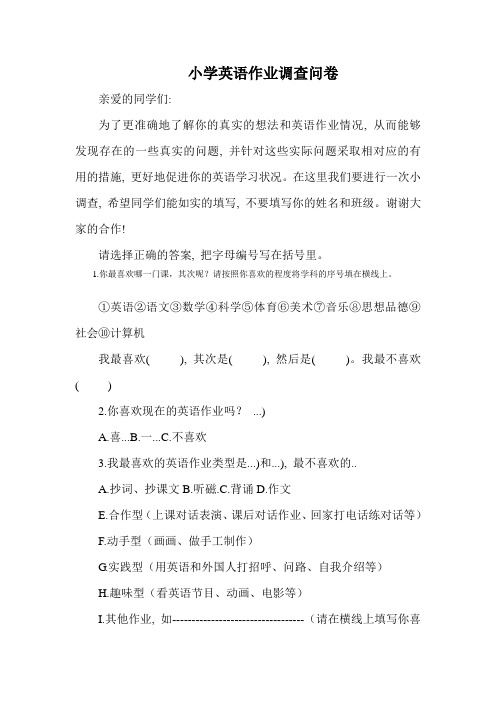
小学英语作业调查问卷亲爱的同学们:为了更准确地了解你的真实的想法和英语作业情况, 从而能够发现存在的一些真实的问题, 并针对这些实际问题采取相对应的有用的措施, 更好地促进你的英语学习状况。
在这里我们要进行一次小调查, 希望同学们能如实的填写, 不要填写你的姓名和班级。
谢谢大家的合作!请选择正确的答案, 把字母编号写在括号里。
1.你最喜欢哪一门课,其次呢?请按照你喜欢的程度将学科的序号填在横线上。
①英语②语文③数学④科学⑤体育⑥美术⑦音乐⑧思想品德⑨社会⑩计算机我最喜欢( ), 其次是( ), 然后是( )。
我最不喜欢( )2.你喜欢现在的英语作业吗?...)A.喜...B.一...C.不喜欢3.我最喜欢的英语作业类型是...)和...), 最不喜欢的..A.抄词、抄课文B.听磁.C.背诵D.作文E.合作型(上课对话表演、课后对话作业、回家打电话练对话等)F.动手型(画画、做手工制作)G.实践型(用英语和外国人打招呼、问路、自我介绍等)H.趣味型(看英语节目、动画、电影等)I.其他作业, 如----------------------------------(请在横线上填写你喜欢的作业类型)4.你愿意完成老师给你布置的家庭作业吗... .A.愿....B.不愿..5.你愿意老师每天都布置作业吗......A.愿.... B.不愿意6. 当作业完成后, 你喜欢老师给你什么样的评价.....A.鼓励性的语.B.贴纸奖....C.打等级7. 你觉得老师留的作业多吗?....A......B.不多8.你觉得老师留的作业如抄单词、背课文有意思吗......A.有意....B.没有意思9.你觉得你不能按时完成作业的原因是什么?(多选)A.不会写,不想.B.会写,但是忘了C.其他作业太多没时间写D.不喜欢写,作业没趣味E.作业留得太.F.不喜欢英语课G.不喜欢英语老H.老师太严厉I.英语太差,没信.........J.学英语没.10.你能针对你的家庭作业, 给老师提一些意见吗11/你认为老师布置的英语作业多吗?( )A.很多 B.较多C.不多 D.太少12/你每次做英语作业大约需要多少时间?( ) A.超过60分钟B.40分钟C.20分钟 D.更少13你认为老师布置的英语作业难吗?( ) A.很难B.难 C.较容易 D.很容易14/你认为老师布置的作业类型丰富吗?( ) A.丰富多样B.比较丰富C.一般D.很单一15/你们班开展英语活动如读英语小报、讲英语故事、英语黑板报等活动吗?( )A.从来没有B.很少C有 D.每年1.2次 E.经常有16、如果作业中遇到困难, 你会向家长、朋友或老师寻求帮助吗?(可多选)( )A. 问家长B问同学问老师 C.不会问17、你愿意和同学们共同完成英语作业吗? A.愿意B.无所谓C.不愿意18、父母是否会为你创设一个学习英语的环境, 如在家你与爸爸妈妈进行简单的英语口语练习?()A、经常会B、偶尔会C、几乎不。
小学生英语学科作业调查报告范文

小学生英语学科作业调查报告范文全文共3篇示例,供读者参考篇1English Homework Survey ReportIntroductionFor my school's English class project this semester, I conducted a survey on the amount of English homework assigned to students in different grade levels. The purpose was to see if there are significant differences in the quantity and difficulty of English assignments among the elementary grade levels. I was curious to find out if the workload increases substantially each year as you move up in grades. My hypothesis was that the amount of homework would be progressively higher in each successive grade level.MethodologyTo gather data for the survey, I created a simple questionnaire that I distributed to a total of 120 students from across the 1st through 5th grade classes at my school. For each grade level, I surveyed 24 students. The survey asked two main questions:On average, how many English homework assignments (worksheets, writing assignments, etc.) do you receive per week?On a scale of 1-5 (with 5 being the most difficult), how challenging do you find your typical English homework assignments?I collected the completed surveys and tallied the results for each question and grade level.ResultsThe data showed some interesting findings regarding the English homework workload across the grade levels. Here is a summary of the key results:Question 1: Average number of English assignments per week1st Grade: 3.2 assignments2nd Grade: 4.1 assignments3rd Grade: 4.9 assignments4th Grade: 6.5 assignments5th Grade: 7.8 assignmentsQuestion 2: Perceived difficulty level (from 1-5 scale)1st Grade: 2.72nd Grade: 3.13rd Grade: 3.44th Grade: 3.95th Grade: 4.3The results clearly indicate that both the quantity of English homework assignments and the perceived difficulty level increase progressively from the lower to higher grade levels. The number of weekly assignments more than doubled between 1st and 5th grades. And while 1st graders generally found their homework to be closer to a "medium" difficulty level, by 5th grade the assignments were considered quite challenging on average.DiscussionThe findings from this survey align with my initial hypothesis that English homework workloads get heavier as students advance through the elementary grade levels. This makes sense, as the skills and material become more advanced and complex in each successive grade. Teachers likely assign more practice homework to ensure students stay on track with developingreading, writing, vocabulary, and other English skills appropriate for their grade level.However, the steep increase in homework quantity between 4th and 5th grades was higher than I expected. One possible explanation is that 5th grade marks an important transition year as students prepare for the more rigorous English curriculum awaiting them in middle school. Teachers may assign a heavier workload in 5th grade to get students ready for the enhanced expectations of secondary English studies.The difficulty ratings were also quite insightful. Students clearly perceive their English assignments as gradually becoming more challenging each year, culminating in a difficulty level hovering between "difficult" and "very difficult" by the time they reach 5th grade. This speaks to the progressive nature of the English language arts curriculum.Of course, this was just a small student-led survey within one elementary school, so the results cannot be overly generalized. A larger and more rigorously-designed study involving schools across different regions would be needed to make any broad conclusions about English homework trends. However, within the context of my school, the findings indicate a steadilyincreasing homework workload from 1st through 5th grades that should be weighed carefully.ConclusionIn summary, this English homework survey showed pronounced differences in the amount and difficulty of assignments across the elementary grade levels at my school. Both the quantity of weekly homework and the perceived difficulty level increased year-over-year, with a particularly substantial jump between 4th and 5th grades. While the heavy 5th grade workload could be justified to prepare students for middle school, the overall findings raise questions about whether English homework is being properly balanced and allocated in the most optimal way across all grade levels. More research would be needed, but this survey suggests it may be worth reviewing homework policies to ensure students are being properly challenged yet not overly burdened at any particular stage of their elementary English education.篇2My English Homework Survey ReportIntroductionFor my English class project this semester, I decided to survey students in my grade about their experiences and opinions on English homework assignments. English is one of the core subjects we study, but it often seems like students struggle with the homework more than other classes. I wanted to find out what kinds of homework we get assigned, how difficult it is, how long it takes, and what students like or don't like about it.To conduct my survey, I created a Google Form with 10 questions and shared the link with my classmates. I collected a total of 75 responses from 4th and 5th graders at my elementary school. Here are the key findings from the survey:Types of English Homework AssignedThe first few questions asked about the different types of English homework assignments students typically receive. The most common types, according to the survey, were:• Reading comprehension worksheets (selected by 88% of respondents)• Vocabulary practice (80%)• Writing assignments like journal entries or short stories (68%)• Grammar worksheets (64%)• Studying for tests/quizzes (56%)A small percentage of students also mentioned getting assigned book reports, research projects, and creative writing assignments like poetry from time to time. But the core homework seems to be comprehension, vocabulary, writing, grammar, and test prep.Difficulty of English HomeworkWhen asked to rate the difficulty of their English homework from 1 (very easy) to 5 (very hard), here's how students responded:• Very easy (1) - 5%• 2 - 28%• 3 - 41%• 4 - 22%• Very hard (5) - 4%So most students felt their English homework fell somewhere in the medium difficulty range, with about a quarterfinding it quite difficult. Only a small portion thought it was very easy or very hard.Time Spent on English HomeworkThe amount of time students spent on English homework each night varied considerably based on the responses:• Less than 30 minutes - 28%• 30-60 minutes - 49%• 1-2 hours - 19%• More than 2 hours - 4%The largest group (about half) spent between 30-60 minutes per night on English homework. More than 1 in 5 students spent over an hour, which seems like a lot for an elementary student. At the same time, over a quarter were able to complete it in less than 30 minutes.What Students Like About English HomeworkStudents were given the option to select what they liked about their English homework assignments from a list. The top responses were:• Feeling accomplished when I finish (64%)• C hance to be creative with writing (48%)• Learning new words/vocabulary (44%)• Reviewing what we learned in class (32%)Many students seemed to appreciate the sense of achievement from completing homework, as well as the opportunities for creative writing. Building vocabulary knowledge and reinforcing class lessons were also noted benefits.What Students Don't Like About English HomeworkOn the other hand, students called out several common dislikes:• Taking too much time (72%)• Finding some assignments too difficult (61%)• Getting bored working alone (44%)• Having too much homework overall (40%)Clearly, the biggest complaint was the amount of time required, followed closely by assignments being too hard. Having to work alone and the overall homework load were also significant pain points.Other Comments and FeedbackThe final open-ended question allowed students to share any other thoughts or feedback about their English homework. Some common themes that emerged were:• Wanting more interesting/fun assignments• Reducing repetitive busywork• More hands-on activities or group projects• Clearer instructions from teachers• Shorter assignments split into sections• Ability to pick di fferent writing topicsWhile many students accepted homework as a necessary part of learning English, there was a desire for assignments to be more engaging, varied, and focused rather than repetitive drills.ConclusionBased on the results of my survey, it's clear that English homework is a mixed experience for elementary students. While some assignments allow for creativity in writing and there's satisfaction in accomplishing the work, students frequently findthe homework load too heavy, the assignments overly difficult or boring, and the time required as a major dislike.Some potential recommendations for teachers based on this feedback could include:• Streamlining assignments to reduce busywork and repetition• Offering more variety, creativity, and choice in writing assignments• Giving clearer instructions to ensure assignments are understandable• Balancing straightforward skills practice with more engaging hands-on activities• Being mindful of overall homework load and time requiredWith some adjustments to increase the quality and engagement of English homework, it may help enhance the learning experience for students. Considering student perspectives could lead to more effective, meaningful, and motivating assignments.篇3English Homework Survey ReportIntroductionFor my latest English class project, I conducted a survey about homework habits and preferences among elementary school students. I created an online survey with 10 questions and distributed the link to students in grades 3-5 at my school and some neighboring schools. In total, I received 128 responses. This report will analyze the key findings from the survey data.Survey ResponsesQuestion 1: What grade are you in?The responses were evenly split between the three grade levels, with 43 students from 3rd grade, 41 from 4th grade, and 44 from 5th grade participating.Question 2: How much time per week do you spend on English homework?The largest group (39%) reported spending 1-2 hours per week on English homework assignments. 28% spent 2-3 hours, 18% spent less than 1 hour, and 15% spent more than 3 hours per week.Question 3: What types of English homework assignments do you typically receive? (Select all that apply)The most common homework types were reading comprehension worksheets (77%), vocabulary practice (71%), and writing prompts (63%). Grammar exercises (49%), spelling practice (43%), and research projects (28%) were also frequently assigned.Question 4: Which types of homework assignments are your favorite?While no single category received a majority, the top 3 favorite types were reading comprehension (24%), research projects (22%), and writing prompts (19%). The least enjoyed were grammar exercises (11%), spelling practice (9%) and vocabulary practice (7%).Question 5: Which types of homework assignments do you find most difficult?Writing prompts were considered the most difficult (35%), followed by grammar exercises (27%) and research projects (18%). The types found to be easiest were vocabulary practice (9%), reading comprehension (7%), and spelling practice (4%).Question 6: How much time do you usually spend on a single English homework assignment?42% spend between 30 minutes to 1 hour per assignment, while 31% spend 15-30 minutes. Only 18% spend over an hour, and 9% spend less than 15 minutes.Question 7: Do you prefer homework assignments to be paper-based or online/digital?Responses were split, with 55% preferring paper assignments and 45% preferring digital assignments.Question 8: Do you feel like you are assigned too much, too little, or just the right amount of English homework?The majority (62%) felt the amount was "just right," while 27% said "too much" and 11% responded "too little."Question 9: Do you receive enough support/guidance from your teacher and parents with English homework?Most students (84%) felt they received enough support from teachers and parents, while 16% said they could use more guidance.Question 10: What is your overall attitude towards English homework?41% said they enjoyed English homework, while 39% felt neutral about it, and 20% disliked it.Key TakeawaysBased on the survey responses, some key takeaways include:Time spent on English homework is generally 1-3 hours per week, with assignments often taking 30-60 minutes each.The most common and favored homework types are reading comprehension, writing prompts, and vocabulary practice. More challenging assignments like grammar exercises and research projects tend to be less enjoyed.Students are somewhat divided on preferring paper vs. digital assignments, suggesting a mix may be ideal.The majority feel they receive an appropriate amount of English homework overall and get sufficient support, though some would like more guidance.While attitudes are mixed, more students appear to enjoy or feel neutral about English homework than dislike it.RecommendationsFrom these findings, I would recommend a few adjustments to English homework for elementary students:Maintain a mix of assignment types, focusing on reading, writing, and vocabulary but incorporating other skills likegrammar and research projects periodically. Vary the formats to make it engaging.Provide detailed instructions, examples, and resources to support more difficult assignments like writing prompts and research to ensure students don't get frustrated.Offer both paper and digital options when possible to accommodate preferences.For students struggling or wanting more guidance, suggest teachers provide supplemental instruction, examples of good work, checklists, or opportunities for extra help.Overall, strive to assign an appropriate amount of homework-not too much to overwhelm students but enough to reinforce skills and learning from class.By implementing some of these recommendations, the experience and effectiveness of English homework could be enhanced for elementary school students. Thank you for considering this report.。
关于高中英语课外作业的调查与反思

关于高中英语课外作业的调查与反思
首先,需要说明的是,高中英语课外作业的质量和数量应该是
适当的。
如果作业过多或者过难,会导致学生的学习负担过重,甚
至降低他们对英语学习的热情。
因此,教师应该合理安排课外作业,确保其质量和数量适当。
针对高中英语课外作业的调查与反思可以从以下几个方面入手:
1.作业量是否合适
调查学生每周完成英语课外作业的时间和数量,了解他们的压
力和负担状况。
如果学生反映作业过多,可能需要适当减少作业量。
2.作业的难度是否适当
调查学生对每个作业任务的难度感受,了解他们是否能够理解
和完成作业。
如果作业难度过高,可能需要适当降低难度,让学生
能够更好地掌握知识点。
3.家庭作业是否有指导
调查学生在家完成英语作业时,是否有家长或者其他人员进行
指导和帮助。
如果学生缺乏指导和支持,可能需要教师在课内加强
辅导和帮助。
4.作业的质量是否达标
评估学生完成作业的质量和效果,了解他们是否能够达到预期
的学习目标。
如果作业质量低下,可能需要教师在课内加强讲解和
重点教学。
总之,针对高中英语课外作业的调查与反思,可以帮助教师更
好地理解学生的学习需要和问题,进而更好地指导和帮助学生提高
英语学习的效果。
小学英语作业状况调查报告
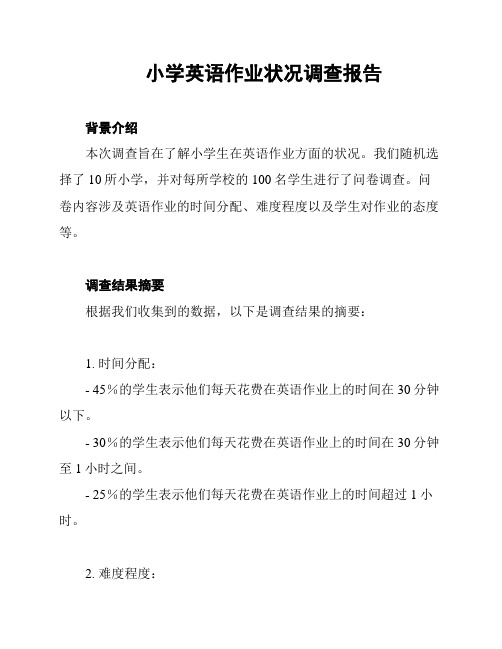
小学英语作业状况调查报告背景介绍本次调查旨在了解小学生在英语作业方面的状况。
我们随机选择了10所小学,并对每所学校的100名学生进行了问卷调查。
问卷内容涉及英语作业的时间分配、难度程度以及学生对作业的态度等。
调查结果摘要根据我们收集到的数据,以下是调查结果的摘要:1. 时间分配:- 45%的学生表示他们每天花费在英语作业上的时间在30分钟以下。
- 30%的学生表示他们每天花费在英语作业上的时间在30分钟至1小时之间。
- 25%的学生表示他们每天花费在英语作业上的时间超过1小时。
2. 难度程度:- 55%的学生认为英语作业的难度适中。
- 30%的学生认为英语作业的难度较容易。
- 15%的学生认为英语作业的难度较困难。
3. 学生态度:- 60%的学生表示他们对英语作业持积极态度。
- 30%的学生表示他们对英语作业持中立态度。
- 10%的学生表示他们对英语作业持消极态度。
结论根据调查结果,大部分小学生每天花费在英语作业上的时间在30分钟至1小时之间,并认为作业的难度适中。
他们对英语作业的态度普遍积极,但也有一部分学生对作业持中立或消极态度。
这些结果对教师和家长提供了一些指导意见,如根据学生的时间分配情况调整作业量,关注那些对作业态度持中立或消极态度的学生,帮助他们养成更好的研究惯。
下一步行动为了更全面地了解小学生的英语作业状况,我们建议进行更深入的调查,包括与学生和教师的面对面访谈,以及观察他们在课堂上的研究状态。
这样可以进一步帮助我们了解学生的研究需求,并提供更具体的建议和解决方案。
致谢我们衷心感谢所有参与调查的学生和学校。
他们的参与使得本调查报告得以完成。
同时也感谢您的阅读和关注!。
小学英语作业检查情况总结

小学英语作业检查情况总结
概述
本文档总结了小学英语作业的检查情况,旨在提供一个对学生作业完成情况的全面了解。
检查方式
老师采用了以下方式检查学生的英语作业:
批改练册:老师对学生在练册上的完成情况进行批改。
作业本检查:老师定期检查学生的作业本,包括写作、阅读和语法练等内容。
学生表现
以下是对学生英语作业完成情况的总结:
优秀:有部分学生在完成英语作业方面表现出色,练册和作业本上的答案基本正确,并且完成质量较高。
良好:大多数学生在完成英语作业方面表现良好,练册和作业本上的答案有少量错误,但整体完成质量较高。
一般:有少数学生在完成英语作业方面表现一般,练册和作业本上的答案有较多错误,需要进一步加强研究。
不及格:很少有学生在完成英语作业方面表现不及格,练册和
作业本上的答案基本都错误,并且完成质量较低。
建议
根据对学生英语作业的检查情况总结,提出以下建议:
给予优秀学生表扬和奖励,激励他们继续保持良好的研究表现。
鼓励良好学生继续努力,帮助他们改正练册和作业本上的错误,提高完成质量。
对一般学生提供额外的辅导和指导,帮助他们弥补知识漏洞,
提高英语水平。
针对不及格学生,与家长合作,制定针对性的研究计划,加强
基础知识的掌握和复。
结论
通过对小学英语作业的检查情况的总结,可以看出大部分学生
在完成英语作业方面表现良好。
通过及时发现问题和采取相应措施,可以进一步提高学生的英语水平和学习效果。
建议学校和家长共同
努力,为学生提供良好的学习环境和支持,以培养他们的英语能力
和学习动力。
小学英语作业布置调查报告调研报告
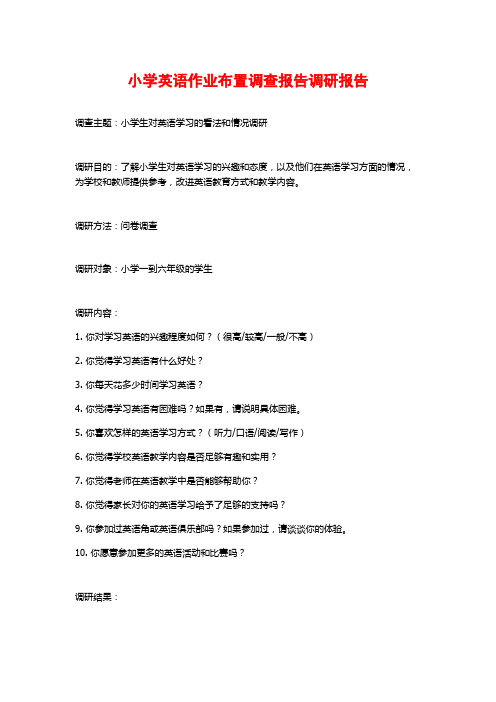
小学英语作业布置调查报告调研报告
调查主题:小学生对英语学习的看法和情况调研
调研目的:了解小学生对英语学习的兴趣和态度,以及他们在英语学习方面的情况,为学校和教师提供参考,改进英语教育方式和教学内容。
调研方法:问卷调查
调研对象:小学一到六年级的学生
调研内容:
1. 你对学习英语的兴趣程度如何?(很高/较高/一般/不高)
2. 你觉得学习英语有什么好处?
3. 你每天花多少时间学习英语?
4. 你觉得学习英语有困难吗?如果有,请说明具体困难。
5. 你喜欢怎样的英语学习方式?(听力/口语/阅读/写作)
6. 你觉得学校英语教学内容是否足够有趣和实用?
7. 你觉得老师在英语教学中是否能够帮助你?
8. 你觉得家长对你的英语学习给予了足够的支持吗?
9. 你参加过英语角或英语俱乐部吗?如果参加过,请谈谈你的体验。
10. 你愿意参加更多的英语活动和比赛吗?
调研结果:
根据调查问卷得出的结果,可以得出小学生对英语学习的整体态度和情况。
通过统计和分析这些结果,学校和教师可以了解学生们的需求和困难,提供更适合他们的英语教育方式和教学内容,同时鼓励学生们更积极地参与英语学习和活动。
初中英语作业分析报告

初中英语作业分析报告1. 引言初中英语作业是学生学习英语的重要组成部分,通过分析作业,我们可以了解学生的英语学习情况,发现问题,采取相应的措施进行辅导。
本报告旨在对初中英语作业进行分析,以期帮助学生和教师更好地进行学习和教学。
2. 作业类型分析通过对初中英语作业的分类和数量统计,我们可以得出以下结论:•阅读理解类作业占比最高,约占总作业量的40%。
•词汇与语法类作业占比次高,约占总作业量的30%。
•口语和听力类作业占比较低,约占总作业量的15%。
•写作和翻译类作业占比最低,约占总作业量的15%。
3. 学生表现分析根据对学生提交的作业进行的评分和反馈,我们可以得出以下结论:•阅读理解类作业中,学生的阅读理解能力较强,但在回答问题时常常出现理解偏差。
•词汇与语法类作业中,学生的基础知识扎实,但在运用知识时存在一定的困难。
•口语和听力类作业中,学生的口语表达和听力理解能力相对较弱,需要更多的练习和训练。
•写作和翻译类作业中,学生的写作和翻译能力有待提高,需要更多的指导和范例。
4. 教学建议基于以上的分析结果,我们提出以下教学建议:•针对阅读理解类作业,教师可以加强问题分析和阅读策略的教学,帮助学生提高理解能力和答题技巧。
•针对词汇与语法类作业,教师可以设计更多的练习和应用题,帮助学生巩固基础知识并提高运用能力。
•针对口语和听力类作业,教师可以组织更多的口语交流和听力训练活动,提高学生的口语表达和听力理解能力。
•针对写作和翻译类作业,教师可以提供更多的写作范文和翻译实例,引导学生学习优秀的表达方式和翻译技巧。
5. 总结通过对初中英语作业的分析,我们可以得出学生在不同类型作业中的表现和问题所在。
通过针对性的教学措施和建议,可以帮助学生提高英语学习的效果,更好地掌握语言技能。
教师应根据学生的实际情况进行个性化的辅导,帮助他们克服困难,取得更好的学习成果。
希望本报告能为学生和教师提供有益的参考和指导,使英语学习更加有效和有趣。
- 1、下载文档前请自行甄别文档内容的完整性,平台不提供额外的编辑、内容补充、找答案等附加服务。
- 2、"仅部分预览"的文档,不可在线预览部分如存在完整性等问题,可反馈申请退款(可完整预览的文档不适用该条件!)。
- 3、如文档侵犯您的权益,请联系客服反馈,我们会尽快为您处理(人工客服工作时间:9:00-18:30)。
英语作业调查报告我们对山南小学一至五年级学生英语作业情况作了一个抽样调查,现将调查结果总结如下;(一至五
通过调查,当然这个调查并不能代表全体同学的心声,可是却非常有代表性。
我们从上面的调查表格中可以看出现在小学英语作业在布置上普遍存在两个极端:一是作业布置形式单一乏味,抄抄背背的机械练习较多,很少考虑到学生的天性;二是家长对英语学习的态度低年级要好于中高年级。
很多家长把注意力外移,更多的关注课外英语学习班作业。
三是我们教学的关注点单一,只是简单的课文背诵、听读、英语学习在小学阶段还没有上升到交际的层面。
这种机械固定、一成不变、缺少创造性的作业将严重影响学生学习兴趣、挫伤学习热情,影响身心的健康发展。
当然这并
不是老师们的错,而是现在评价的体制对老师和学生都非常单一,所以制约了学生和老师的发展。
通过这次调查和我们平时的观察我们认为在家庭作业的设计上,应少布置一些以机械抄写、做题为主的练习,多设计一些开放性的、需要学生主动去体验、实践、参与、合作与交流等的作业。
我们现在的英语课堂教学有了很大的提高,学生在课堂上的活动多了,兴趣浓了,然而一走出课堂,学生往往就体会不到这种成功的感觉。
为了给孩子创造更多的学习机会,我们还需要设计一些精彩的作业,作业是课堂教学的补充和延续。
英语课程标准指出:教师要把凡是学生能够自己独立做的事情都给学生留出空间,让学生有时间、有机会去选择、决定,去思考,去体验、感悟,去创造、实践、应用。
因此我们总结了一些过往好的经验和对今后布置作业的改善措施。
(一)、根据学生的年龄特点,设计趣味性的作业内容。
1创意作业。
小学生所学的英语大多和日常生活密切相关,如文具用品、家居生活用品、交通工具、动物名称等等。
学了这类单词后,布置学生为这些物品贴上英语标签,根据实际情况或者在实物上贴上标签,如:pencil, pencil-box, desk, chair等,或者让学生画出这一物品再在画纸上写下这一英语单词,如:rabbit, tiger, car等,还可以让学生手工制作出这些物品然后贴上标签,如ship, boat, plane, bird等。
由于此类作业更具趣味性,能够使学生在完成作业时注意力高度集中,因此可更好地帮助学生牢记单词,同时也能提高他们的英语书写水平及审美能力。
2说唱作业。
新标准英语教材中有许多chant、 song和rhyme帮助学生去巩固、记忆句型,但我觉得这远远满足不了学生爱唱的需求。
随着学生英语知识的增加,技能的增强,我们建议在学习一种新句型后,要求学生根据音乐节奏,自己用唱歌的形式把句型唱出来。
如:Are you Linda? Are you Linda? Yes, I am . Yes, I am . Are you in the garden? Are you in the garden? No, I’m not. No, I’m not.这样的作业会给学生一个充分读、思考的过程,让学生有一个自己再创作的空间。
3录音作业。
在英语教学中,为了让学生能够牢固地掌握标准的语音语调,老师经常布置学生课后听读录音,但是如果老师只是一味地让学生单调机械地重复听读容易使学生产生厌倦心理,较难达到良好的学习效果。
我们可以变换方式,让学生模仿课文朗读制作录音磁带,定期进行全班评比,那么他们就会不厌其烦地反复听读录音进行制作,以求达到最佳效果。
此类作业不仅能使学生在潜移默化中形成英语的语感,而且也能培养学生的竞争意识。
4收集信息作业。
随着英语的普及,越来越多的英语出现在我们的周围。
只要稍加留意,学生们就会发现英文商标、广告、标牌处处可见。
布置学生自己收集、摘抄这些英语,学生表现得很积极,反馈回来的作业也很丰富。
如我在教授完句型“What does that sign mean?”后,布置学生观察公共场所的标志,并且把它上面的英文摘抄下来,进行补充教学。
课堂上学生反应踊跃,积极展示他们的“新发现”,如:No water. No smoking.等。
此类作业不但可提高学生兴趣,增长知识,还能培养学生良好的观察习惯和自觉的学习意识。
5观察作业。
教师可以布置一些有关观察记录的作业,让学生留心观察生活,然后再到课堂上用英语汇报记录结果。
如我们在学习季节的时候,可以让学生描述我们城市一年四季的变化和人们的穿着。
6实践性作业。
例如在教食物这一单元时我布置给了学生一个特殊的课后任务,即请同学们自制一张食物表格,并调查家庭成员或同学对于食物表格上所列的食物的喜恶。
可以把调查结果以文字汇报形式呈现或以数据统计表格形式呈现。
学生在完成此次作业的过程中,既充满一定的实践性、趣味性,又有一定的自主性和选择性。
学生可以把课堂上所学的知识与生活实际相联系。
同时这个调查任务既能使学生进一步巩固所学知识也使他们学会关心身边的人,从了解他们喜欢和不喜欢吃什么开始。
7合作型作业——编辑手抄报手抄报活动以培养学生的能力为目的,把教学推向深入,给学生提供一个运用语言的空间,让学生把学到的知识运用到实际生活中去,真正使学生学以致用。
如学了“there be”句型结构后,我们让学生以此为主题编辑一份手抄报,内容是为自己设计一个家,要求图文并茂。
内容明确后,同学们立即行动起来,他们动脑筋,想办法,查资料,设计版面,编排内容,真是“八仙过海,各显神通”。
事后,同学们的手抄报版面活泼,构思新颖,内容丰富,赏心悦目。
同时,同学们在编辑手抄报过程中,通过对“there be”句式的反复研究与运用,加深了对此句式的理解,运用能力也大大提高。
可以说,手抄报是锻炼和培养学生提高和运用语言能力的良好平台。
8归类作业。
学生在学过一类单词后,可以让学生自己归类总结,通过积累来增加英语词汇的量。
如:学习形容词,我们可以让学生通过给颜色归类、给一些大小、多少等形容词归类,让学生累积学习过的词汇。
(二)、尊重学生的个体差异,设置个性化作业。
一直以来,作业的形式、内容都由教师作了统一的规定,完全忽略了学生的需要。
新课程背景下,教师要把凡是学生能够自己独立做的事情都给学生留出空间,让学生有时间、有机会去选择、决定,去思考,去体验、感悟,去创造、实践、应用。
学生可以根据自身发展自由难易不同的作业类型。
让基础较差的学生选择容易一些的作业,学有余力的学生可以自主地选择多项作业。
这样的形式打破了以往单一的作业模式,增加了作业的弹性,把选择权交还给学生。
充分考虑到学生的学习基础,学习需要的差异,体现了学生的主观需求,发挥学生的自主性。
加上相应的评价制度,学生会自主地完成自选的作业,作业的积极性也会提高。
学生能自己选择想完成的作业,多了选择的空间,多了主动的权利,作业在他们的眼中就由小溪变成了浩瀚的海洋,有着取之不尽的乐趣。
作业布置只是整个英语教学环节中的一个小环节,但它却是反映学生知识与能力的一面镜子,因此在今后的教学工作中,必须慎重对待这一教学环节,精心设计,合理布置每一次作业,以使学生运用英语的能力得到应有的提高。
